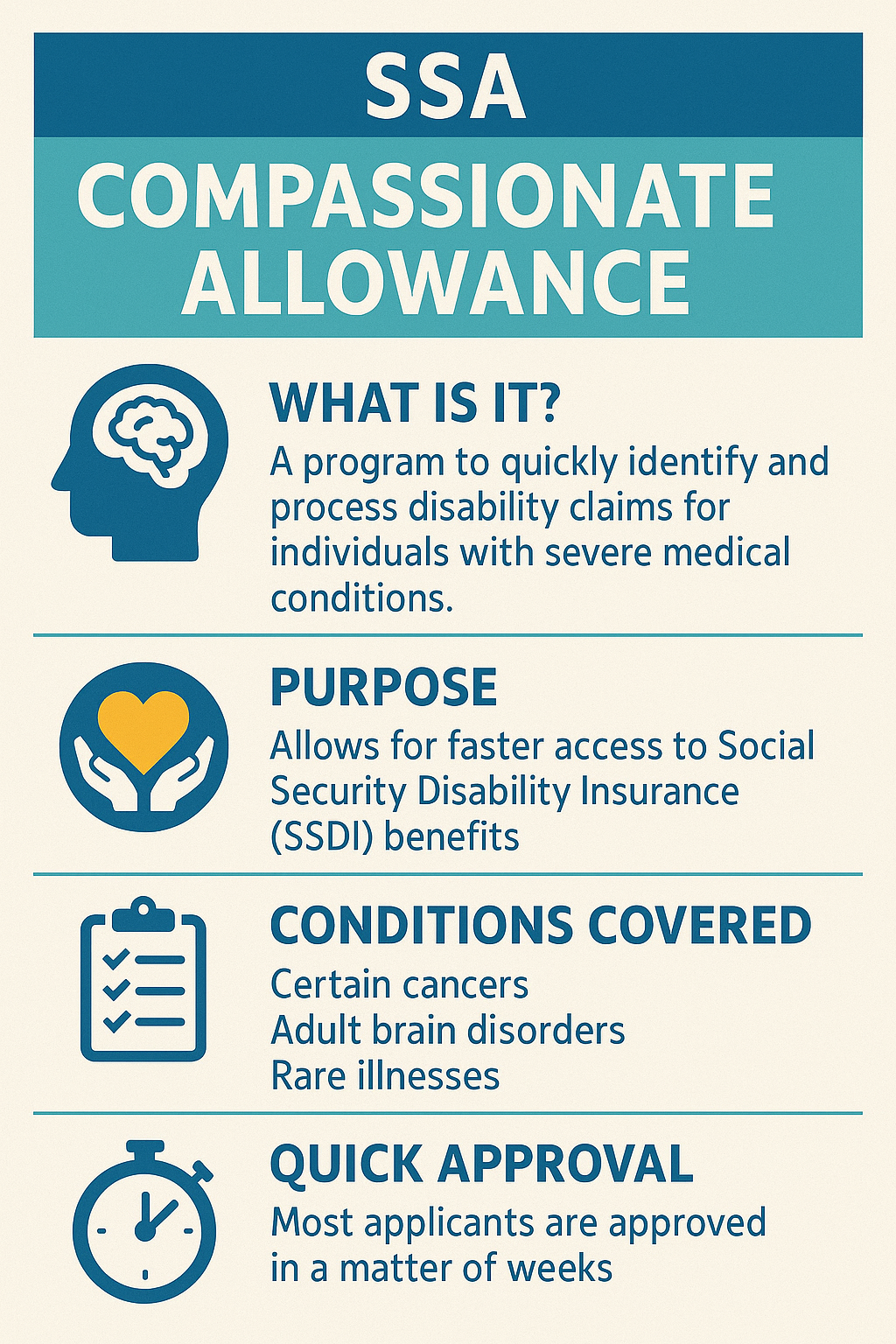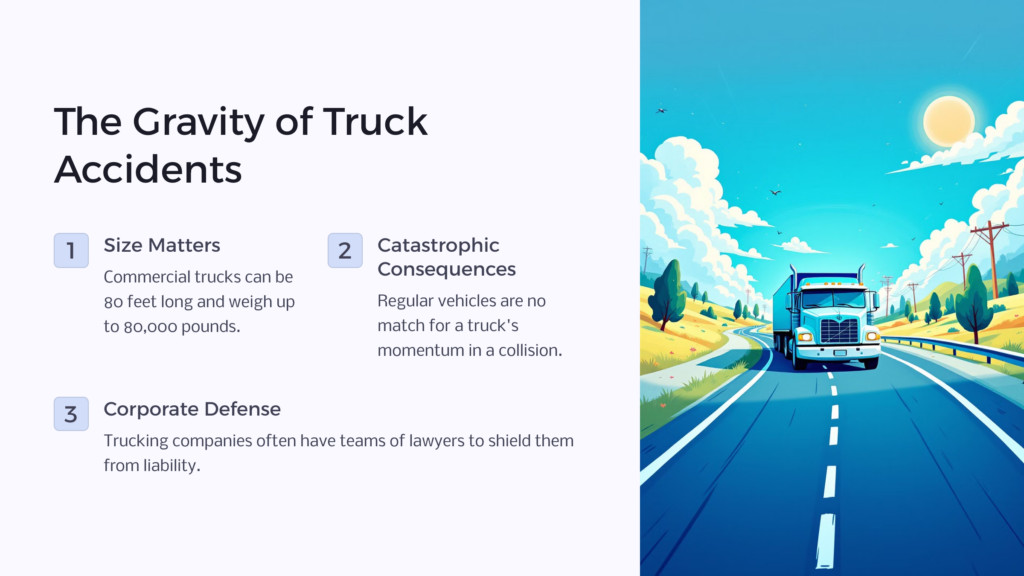
Commercial truck drivers have a major responsibility whenever they take their vehicle on the road. Their vehicles are at the top of the food chain, so to speak, because of their size and weight. These trucks could be 80 feet in length and weigh 80,000 pounds—even more depending on their cargo or if they have special permits. If their vehicle becomes involved in an accident, the results can be truly catastrophic. A normal car or SUV doesn’t stand a chance against the momentum of something so much bigger and heavier. Trucking companies are often giant corporations, represented by a staff of attorneys and insurance companies designed to shield them from liability if they cause an accident.
If you have been involved in a truck accident, such as with a tractor-trailer, large box truck or bus, or an 18-wheeler, a call to 911 will bring the police, ambulance and fire department as needed to help the injured, contain any fire or spillage from the truck, and control traffic around the scene.
You must act quickly to protect yourself and your family from serious health and financial problems that could haunt you for years to come. Get immediate medical attention for yourself and your passengers, even if you don’t feel too badly. Aches, pains, internal bleeding and other damage may become more evident once the mental and physical trauma of the moment subsides and you can concentrate on how you are feeling.
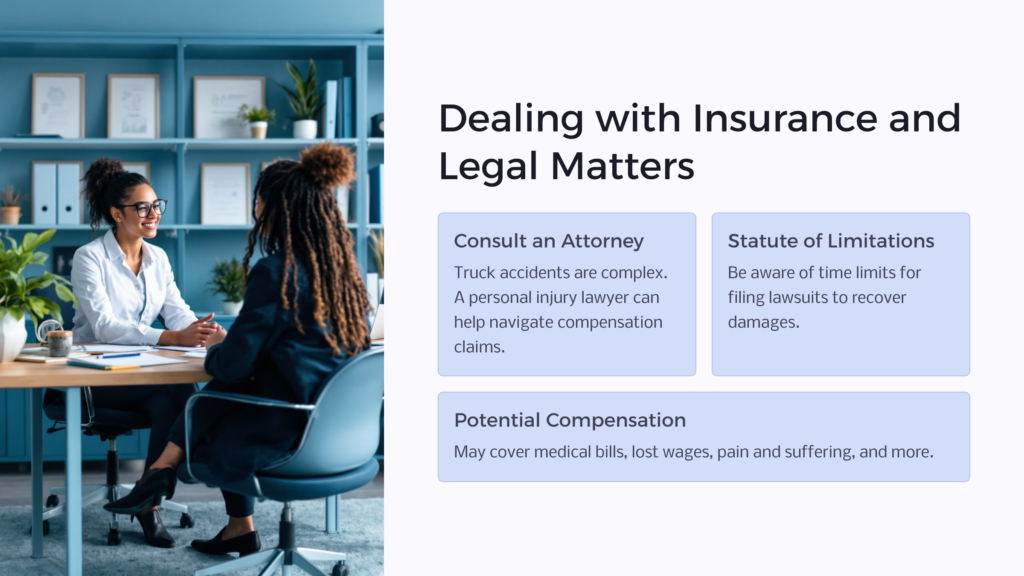
Once medical conditions have been identified and tended to, you may be able to gather your thoughts as to what happened and begin to deal with the financial liability of the event. Regardless of who or what you may think caused the accident, you should begin to collect evidence to help you piece it together. You will need this to pursue compensation from those responsible, or defend yourself if you were the cause of the accident.
Waiting even a day may allow time for evidence to be missed, tampered with or destroyed. The trucking company will likely have investigators at the scene on their behalf within hours. You should too, if at all possible.
Minor auto accidents may not require an attorney to be involved, but a truck accident can be much more complicated. Evidence needs to be found, collected, and preserved before it is gone forever. You may greatly shortchange yourself just filing through your insurance company and accepting their settlement. It is in your best interest to consult with a personal injury attorney to evaluate what a reasonable payment might be, and how to get compensation from the party at fault. Such a civil suit has a definite statute of limitations, which is the time period in which you can file a lawsuit. If you miss that window, no one is going to be able to help you recover damages for medical bills, lost wages, pain and suffering, or even the death of a loved one.
In this article, you will learn what steps to take if you are involved in a truck accident—immediately and in the months ahead.
What Trucking Accident Victims Need to Know “Before the Fact”
You may be researching this topic because it’s happened to someone you know or you’ve read about an accident in the news. More likely, you are reading this because you or someone close to you have already been in an accident and are looking for information on how to get compensation from the company that caused damages. We will explain what you could have done if you were physically and mentally able to at the scene. If you didn’t do these things, and you and your passengers were seriously injured or killed, you need to contact a personal injury attorney experienced in trucking accidents as soon as possible to investigate the accident and verify who was at fault and get compensated for your injuries and recovery.
The Insurance Company is Not Your Friend. Don’t make statements. Don’t sign anything.
Don’t be shocked if an entire team from the trucking company or their attorneys show up at the scene of the accident before it’s cleared away, especially if it is a really serious collision with, for example, several fatalities. Their job is to reduce the liability of the trucking company or others they are working for. They may arrive and cover the truck and logos with tarps to prevent your attorney’s investigator from taking pictures or reporters from giving unwanted publicity. Remember that these people are experts, and they know what to do to protect their own interests.
They may want to talk to you or your passengers. They might try to get you to commit to a statement while you’re still upset or worried about injuries and not thinking clearly. They may ask you to sign documents that you may not fully understand, or even to accept an on-the-spot settlement before you have even consulted with a doctor or an attorney. They could offer what seems to be a lot of money, but they are trying to get you to accept as little as possible, without you having time for a doctor to assess what it will take for you and your passengers to be treated, rehabilitate and recover, without you having on opportunity to speak with an experienced truck accident lawyer who can ensure you maximize any recovery.
Important points to remember here:
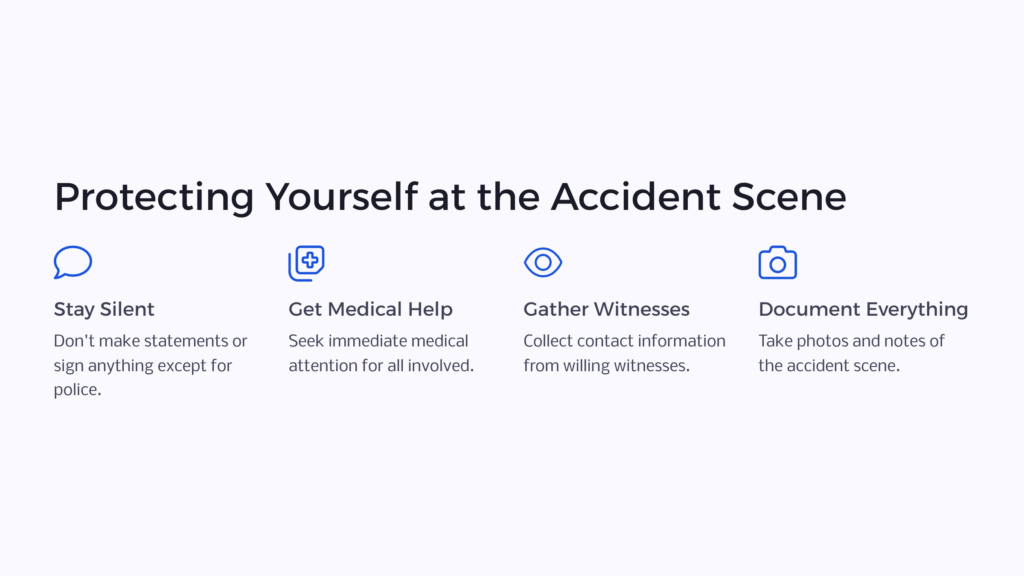
- Do not sign anything, even if you feel fine. You are under duress.
- Do not give statements except to the police. Keep to the facts, not what you think happened.
- Do not take blame or place blame on anyone. State facts, but do not say things that could be misinterpreted, such as saying that you think the accident could be your fault, e.g., “I thought he was going to turn” or “I couldn’t stop in time.”
- Do not give information to anyone except the police or emergency medical team.
- Make sure the truck company representatives cannot overhear your conversations.
- Get immediate medical attention for yourself and your passengers, even if you don’t feel too badly. Pain and internal bleeding may not be noticed until hours later.
- If someone is clearly a witness and willing to help you, find out what they saw and get their contact information.
Do not assume you were at fault. There are many possible causes that are beyond your control. There are regulations that apply to large trucks, and you don’t know what violations may have caused them to be in an accident with you. If you were at fault, the trucking company will do everything they can to prove it.
What You Should Do to Recover Physically and Financially
It is very important that you go to a hospital or doctor and explain every pain and injury that you have soon after the accident. All such problems need to be documented. Some may seem insignificant at first but then progress to become worse and worse. Follow your doctor’s instructions regarding therapy and medications. Failure to comply with recommended treatment could hurt you and your case.
Tell your doctor of any new physical limitations as a result of the accident. Be honest with this information. If you complain that you cannot run or bend over or lift heavy objects, the other side may hire private investigators to conduct video surveillance. If they find you doing these activities, your case may be severely compromised.
It is also vital that you attend all medical appointments. The trucking company attorneys may attempt to show that any missed appointments indicate that you are fully recovered or were making up the complaints.
You should keep a log with these medical details. Your log should include your daily feelings, emotional state and physical problems, along with a record about any treatments. If a doctor’s appointment is missed, try to get the doctor to add the reason for the missed appointment to the file.
Have your doctor provide his/her opinion for the long-term prognosis of your injuries.
Expand the log to note your transportation expenses and time traveled to and from all medical appointments for your doctor, specialists, or physical therapy. Include other expenses, such as prescriptions, bandages and medical devices like crutches. If you must hire someone to help you in your home full or part time, keep track of that as well.
Transportation expenses concerning the repair or replacement of your vehicle or obtaining a temporary rental car should also be written down.
Any receipts that you receive from any of the above expenses should be kept. All these go toward proving your expenses and losses for which you should be compensated.
Make certain you are forthcoming to your own attorney about any previous medical problems or injuries. The other side will undoubtedly find out this information during their investigation, and it is important that your attorney be prepared for any such details.
Make certain your truck accident attorney knows about anything concerning your own negligence involved in the accident, which, for example, would include drinking alcohol before the accident or texting. Advise your lawyer if your own car was deficient in some matter, such as having bad brakes or lights that were not working properly. Negligence in such a case is on a sliding scale. Your attorney must know everything to put the entire case into perspective.
Don’t be misled if an insurance adjuster tells you that you don’t need an attorney because they demand high fees, and that you’d do better without one. Adjusters are trying to reduce the amount of the claim for their own company. He or she is not representing your best interest. They know that even after an attorney deducts their fees from a settlement, it is probably much more than they are trying to get you to agree to.
Your best course of action is to have an experienced truck accident attorney who has invested time and money in the specialized training necessary to handle these kinds of cases. You can rely on his or her skill and experience to make the judgments and decisions necessary for the case to be successful. Your attorney can fairly evaluate your specific case and reach a reasonable estimate of how much compensation you could expect to receive.
Expenses and Trauma You May Be Compensated For:
- Loss of life (wrongful death)
- Medical expenses (incurred so far and in the future)
- Personal care
- Lost wages
- Future earnings
- Pain and suffering
- Loss of spousal relationship (loss of consortium, which includes loss of advice, attention, and care)
- Property damage
Medical Expenses, Current and Future
Under this category would be expenses related to an ambulance response, police and fire department response, emergency room care, diagnostic procedures, surgeries, in- and outpatient care, rehabilitation, physical therapy, orthotics, plastic surgery, orthopedics, specialists, equipment, (such as crutches, special equipment for driving a car, or a wheelchair), or nursing care at home.
You will likely have a good idea of your total medical expenses at any particular point in time as you recover, but compensation for those items involve not only what you have incurred right now but also what your medical expenses will likely be in the future. Although your doctors and attorney can make an educated guess on future medical care, no one has a crystal ball. Additional unexpected surgeries may be involved, or long-term medical care, including physical therapy or psychological counseling, may be needed. It would be easy to overlook or underestimate many of these. Computer programs are now available to help determine these figures.
Estimating medical expenses long term ultimately becomes just a guess, but it has to be the best guess possible. Once a settlement is agreed upon or a court awards damages, there is no going back and asking for more money at a later point in time.
Lost Wages
This is missing wages for lost time when you have not been able to work due to the accident. It includes wages that you may miss because of future hospitalizations, surgeries, doctor’s appointments, or physical or cognitive therapy sessions as well.
Future Earnings
This figure is determined from considering your age, type of employment, skill level, experience, and the likely number of working years remaining in your life based on your life expectancy. If you are partially disabled, this will also be taken into account.
Pain and Suffering
This would include not only the mental and physical distress that has been felt up to now but also in the future. It would be based on the extent of pain as well as the type and severity of the injuries.
Loss of Spousal Relationship
Your injuries may prevent you from maintaining a normal and healthy marriage, including having a loving and sexual relationship.
Property Damage
If your vehicle was damaged, the insurance of the responsible party should repair it. If the damage is too severe, it may be declared a total loss, and a fair market value offer might be given. Be cautious that the offer from the other insurance company is fair.
Truck Accident Checklist
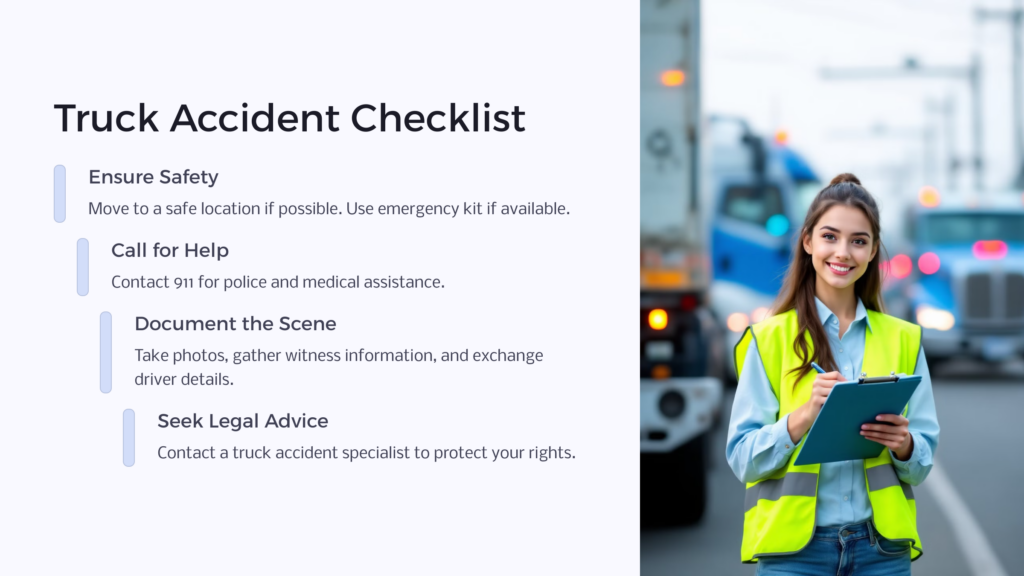
- If you are involved in a truck or large vehicle accident, a number of tasks must be accomplished right away. Use this checklist to prioritize these to help you manage this emergency.
- Keep your wits about you, and follow these steps to the best of your ability. You have a plan. Now follow it.
- Move your vehicle to a safe location if it is drivable after the police tell you it’s okay to do so.
- If you have an emergency roadside kit, use the contents. Use flares or reflectors to warn oncoming traffic of the situation. Prevent another accident from happening.
- Find out if anyone is injured and call 911 for an ambulance if this is the case.
- Call the police at 911 if you’re able to, and wait for them to arrive.
- Don’t talk to anyone about the accident (nor should your passengers) except the police and especially don’t say anything about who you think was at fault.
- Obtain any witnesses’ names and contact information and ask them to wait for police.
- Take photos. If no cameras are available, use a cell phone camera. Take pictures of:
- The injured (face shots for identification) and injuries
- Skid marks (try to show them in relation to a landmark)
- License plate numbers of all vehicles involved, including the tractor and trailer
- Any other numbers on the truck or trailer
- Vehicle damage or damage to other property
- Notice any defective equipment, such as tires, lights, or dirt that was obscuring lights or reflective markings.
- Exchange driver, vehicle, and insurance information with all drivers involved.
- If the truck driver is not the owner, find out who is along with their contact information.
- If any vehicles are towed, find out where the vehicles are being stored.
- Make notes of what happened and anything you observed before, during, or after the crash. Write down the location, nearest intersection, landmarks, light poles (look for pole numbers on a metal tag affixed to it), traffic signals, and note if they were working properly, describe the lighting if at night, any road signs, such as speed limit or warning signs, and the weather conditions.
- Draw a diagram of the scene to help you remember in the coming days, weeks, months, or years.
- Call your insurance company to report the accident.
- Contact an attorney who specializes in truck accidents to protect your rights.
 Benefits.com Advisors
Benefits.com Advisors
With expertise spanning local, state, and federal benefit programs, our team is dedicated to guiding individuals towards the perfect program tailored to their unique circumstances.
Rise to the top with Peak Benefits!
Join our Peak Benefits Newsletter for the latest news, resources, and offers on all things government benefits.
















